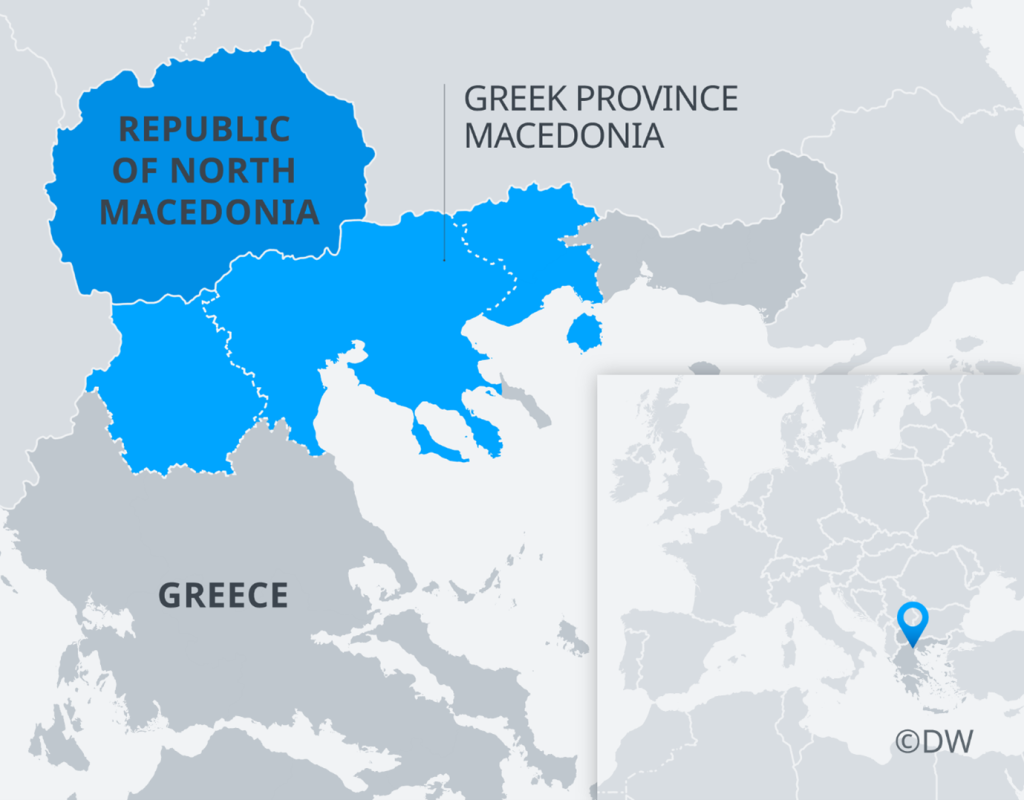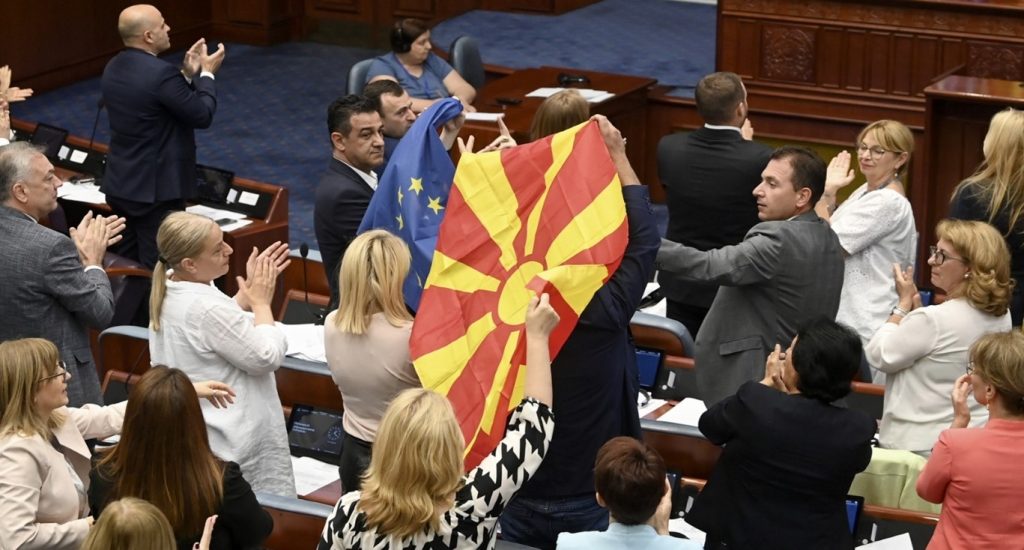Who are the North Macedonians? This question has been one of the most controversial in the process of nation-building of the small Balkan state of North Macedonia, simply named Macedonia until the Prespa agreement of June 2018 that put an end to the age-long-standing controversy with Greece on the country’s name. Since its independence from Yugoslavia in September 1991, Macedonia attempted to build from scratch its national identity, struggling for the acknowledgement of the uniqueness of its language, ethnicity, and culture – despite the diffused accusation of lacking a real nationhood and instead being the result of Bulgarian, Serbian, and Albanian overlapping influences in the region as well as a country that “stole” its name and history from Greece.

Source: https://en.wikipedia.org/wiki/File:Karta_Makedoniia_po_programa_na_Makedonskite_narodnici_-_D._Chupovski_1913,_St_Petersburg.jpg.
The modern history of Macedonia reflects the complexity of a region that in the last centuries and decades has undergone several dominations and political authorities. Conquered by the Ottoman army in the first half of the 15th century, the region stayed under Ottoman rule for about five hundred years, during which the cities of Skopje and Bitola became capitals of the Ottoman provinces – respectively, of the Sanjak of Üsküb (later part of the Prizren Vilayet) and of the Sanjak of Manastir (later part of the Manastir Vilayet). The Vardar River valley, later to become the core area of the Republic of Macedonia, was taken from Ottoman rule for a short period in 1878 after the Russo-Turkish War, becoming part of Greater Bulgaria. However, when the dispositions of the Treaty of San Stefano were revised by the Congress of Berlin, Macedonia was reintegrated in the Ottoman Empire. Still, after the Balkan Wars (1912-13) and the Bucharest Treaty (1913), the greatest part of what is now North Macedonia was attributed to the Kingdom of Serbia which, after World War One, would merge in the Kingdom of Serbs, Croats, and Slovenes – later Kingdom of Yugoslavia. Within Yugoslavia, the territory of contemporary North Macedonia became part of the so-called Vardarska Banovina. During World War Two, between 1941 and 1944 the Vardarska Banovina was given almost entirely in administration to Bulgaria, an ally of Nazi Germany; at the same time, the westernmost territories, inhabited by people of Albanian ethnicity, were instead annexed to the Kingdom of Albania, then under the rule of fascist Italy. After the war, Yugoslavia was reconstituted as a federal state under the Communist leadership and when the former Vardarska Banovina was liberated in 1944, most of it was formed into a separate republic, while the northern part remained to Serbia. In 1946, the new republic received federal status as the Socialist Republic of Macedonia within the Socialist Federal Republic of Yugoslavia. Since then, Greece resented the Yugoslav governmental decision to use the name “Macedonia”, as it was perceived as a pretext for future territorial claims over the homonymous Greek province. Moreover, since the time of the Balkan Wars, Bulgaria advanced territorial claims over the region. Thus, to dilute Bulgarian claims the Yugoslav authorities promoted the development of the ethnic identity of Macedonians and of the Macedonian language – a South Slavic idiom most closely related to Bulgarian.
During the breakup of Yugoslavia, in September 1991 a referendum was held which established Macedonia’s independence from Yugoslavia, under the name of Republic of Macedonia. After the independence, the country’s international recognition was delayed due to the Greek objection on the name and national symbols referring to Ancient Greek history – specific to Alexander the Great – and potentially implying irredentist territorial claims. As a compromise, the United Nations recognised the state under the name of Former Yugoslav Republic of Macedonia (FYROM). Since 1991, the relations between Greece and FYROM were hampered until in 2018, as seen, the Prespa agreement resolved the long-standing dispute between the two countries, changing the name of the latter into Republic of North Macedonia. This accord allowed the country to quicken its adhesion to the Atlantic Alliance, which occurred in 2020, as well as its ongoing negotiations for EU integration.

However, even if the dispute with Greece is finally over, North Macedonia still has some unsolved difficulties to overcome with neighbouring Bulgaria. One issue originates from the recognition of Bulgarians as founders of the state. For most Bulgarians, Macedonians are a division of their community and an artificial creation of Yugoslav leader Tito. Generally, Bulgarians view current North Macedonia, North Macedonians, and the Macedonian language as part of Bulgarian identity. Although Bulgaria was one of the first countries to recognise in 1992 the independence of Macedonia from Yugoslavia, the relations between Sofia and Skopje have been often inconsistent and swinging. Bulgaria refuses to recognise a separate Macedonian nation and language, arguing that ethnic Macedonians are a subgroup of the Bulgarian nation, and that the Macedonian language represents a Bulgarian dialect. These ideas concerning Macedonia have been entrenched in Bulgaria since the time of the nationalist-communist regime of Todor Zhivkov, who believed that the building of a Macedonian nation was a plan carried out by Yugoslav authorities to weaken Bulgaria.
In the last few years, Sofia has often averted Skopje’s EU accession due to controversies grounded on identity. Despite signing in 2017 a friendship treaty to improve bilateral relations – which resulted also in the creation of a commission dealing with historical and educational matters – in 2019 a “framework position” was issued by Bulgaria warning that the EU accession process would be blocked if North Macedonia did not abide by several demands regarding what Bulgaria perceived as “anti-Bulgarian ideology” in the country, aimed at discriminating Bulgarian history and people. In October 2020, Bulgaria offered a compromise and agreed to recognise the Macedonian language and identity if North Macedonia conceded that North Macedonians historically had Bulgarian roots and that their past was interwoven with that of Bulgaria. However, this proposal was rejected by Skopje, and, as a result, in November 2020 Sofia refused to approve the EU’s negotiation framework for North Macedonia, essentially blocking the official commence of accession talks with the country.
In January 2022, the governments of Bulgaria and North Macedonia revived a new set of talks to improve bilateral relations and discuss Skopje’s EU integration. Under heavy pressure from the EU, in June 2022 the Bulgarian parliament finally agreed to lift its veto over the opening of North Macedonia’s EU accession negotiations. This EU mediated deal during the French European presidency was aimed at putting an end to the deadlock on the “history dispute” between Skopje and Sofia that for two years had blocked the start of North Macedonia’s EU accession talks.
Nonetheless, to enhance the deal North Macedonia is expected to fulfil some Bulgarian requests by amending its constitution. Specifically, a parliamentary commission will have to draft amendments to the constitutional preamble so that Bulgarians are also listed along other peoples as founders of the Macedonian state. After the commission drafts these changes, the new document is expected to reach the parliament between next summer and early autumn for voting. However, the government faces a major problem in securing a two-thirds majority of at minimum 80 legislators in the 120-seat assembly. Also, most opposition parties are expected to contrast such a change, although the current government is pressing its case that the vote is crucial for the country’s EU accession. To be sure, almost all parliamentary opposition parties have refused to delegate experts to the parliamentary commission instigated by the Ministry of Justice to amend the constitutional preamble. However, despite the lack of opposition representatives, the North Macedonian government went along with the commission’s formation – although some members of the commission acknowledged that the absence of opposition representatives could represent a significant issue, manifesting the lack of inter-party consensus on the proposed draft. In this respect, the vote to amend the constitutional preamble is expected to fail.

Source: https://balkaninsight.com/2023/04/24/north-macedonias-constitutional-change-commission-faces-opposition-resistance/.
In case the amendments on Bulgarian historical identity will not be accepted, anti-Bulgarian feelings and chauvinistic rhetoric could cost a lot to North Macedonia. Until Skopje will not be able to overcome its perhaps unmotivated phobia towards Bulgaria, refusing to consider the Macedonian historical heritage somewhat linked to that of Bulgaria, EU accession could take much longer or even be sabotaged. Sofia’s government has manifested very clearly that Bulgaria will not accept any humiliating situations stemming from its bordering neighbour that may discriminate Bulgarian national pride and heritage. Thus, North Macedonia must choose to find a compromise between the government and the forces of the opposition to satisfy Bulgaria’s requests and speed up its EU accession, or continue to upkeep an ultra-nationalistic, uncooperative stance that will eventually tarnish its relations with Bulgaria and discourage Sofia from allowing Skopje into the EU.
Paolo Pizzolo
